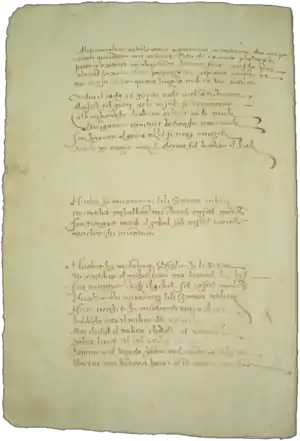Il-Kantilena
Il-Kantilena is the oldest known literary text in the Maltese language.[1] It dates from the 15th century (no later than 1485, the death of its author, and probably from the 1470s) but was not found until 1966 by historians Godfrey Wettinger and Mikiel Fsadni. The poem is attributed to Pietru Caxaro, and was recorded by Caxaro's nephew, Brandano, in his notarial register (Dec. 1533–May 1563). It is preserved at the Notarial Archives in Valletta.[2]

Although written in Maltese, in Latin script, it was a very early Maltese that had not yet been influenced much by Romance languages, and is thus an example of Old Maltese. This text contains many Arabic morphemes. The only Romance words are vintura "luck", sometimes translated into English as fate, and et "and". In general, early Maltese texts contain very little non-Semitic vocabulary; even in later texts, poetry tends to use more Semitic vocabulary than general language use does.[3]
Most likely Maltese spoke the language of the Saracens, in spite of the small nobility of foreign origin. Even Sicilian immigrants would have been more familiar with Saracen arabic than the foreign languages of the nobility of Angevin, Parthenopean, Swabian, or Iberian origin.
Text
Xideu il cada ye gireni tale nichadithicum
|
Xidew il-qada, ja ġirieni, talli nħadditkom,
|
اشهدوا القضاء القعدة يا جيراني ،تعالوا نحدّثكم،
|
Approximate English translation
Witness my predicament, my friends (neighbours), as I shall relate it to you:
[What] never has there been, neither in the past, nor in your lifetime,
A [similar] heart, ungoverned, without lord or king (sultan),
That threw me down a well, with broken stairs
Where, yearning to drown, I descend the steps of my downfall,
I climb back up and down again, always faced with high seas.
It (she) fell, my building, its foundations collapsed;
It was not the builders’ fault, but the rock gave way,
Where I had hoped to find rock, I found loose clay
It (she) fell, my edifice, (that) which I had been building for so long.[4]
And so, my edifice subsided, and I shall have to build it up again,
You change it to the site that suits her/it
Who changes his place, changes his fate!
for each (piece of land) has its own shape (features);
there is white land and there is black land, and red
But above all, (what) you want from it is a fruit.[5]
References
- Friggieri (1994:59)
- "Kantilena". Office of the Notary to Government and Notarial Archives. Archived from the original on 7 January 2018.
- http://melitensiawth.com/incoming/Index/The%20Arabs%20in%20Malta/1975Approaches%20to%20medieval%20Malta%20Luttrell.pdf p. 66-7.
- See Mark Montebello, "Between rectitude and incongruity: The chiastic structure of the Cantilena (Rabat, Malta: Faraxa Publishing House, 2016), p. 29.
- http://melitensiawth.com/incoming/Index/The%20Arabs%20in%20Malta/1975Approaches%20to%20medieval%20Malta%20Luttrell.pdf pp. 66-7.
Bibliography
- Friggieri, Oliver (1994), "Main Trends in the History of Maltese Literature", Neohelicon, 21 (2): 59–69, doi:10.1007/BF02093244
External links
- Il Cantilena
- "Il-Kantilena ta' Pietru Kaxaru" talk by the Akkademja tal-Malti on Campus FM.
- Il Cantilena: How much can a modern Arab decipher is a translation of the Cantilena using similarity to classical and contemporary Arabic, by an Arabic speaker.
- Mejju ġie bil-Ward u Zaħar, the second oldest known document in Maltese (nearly 200 years younger than the Cantilena)